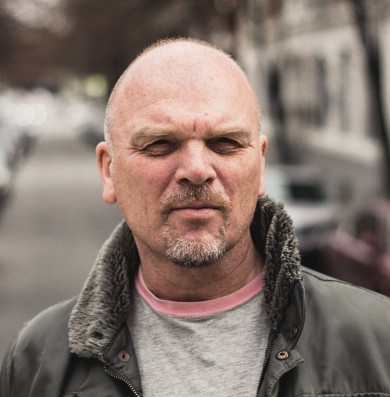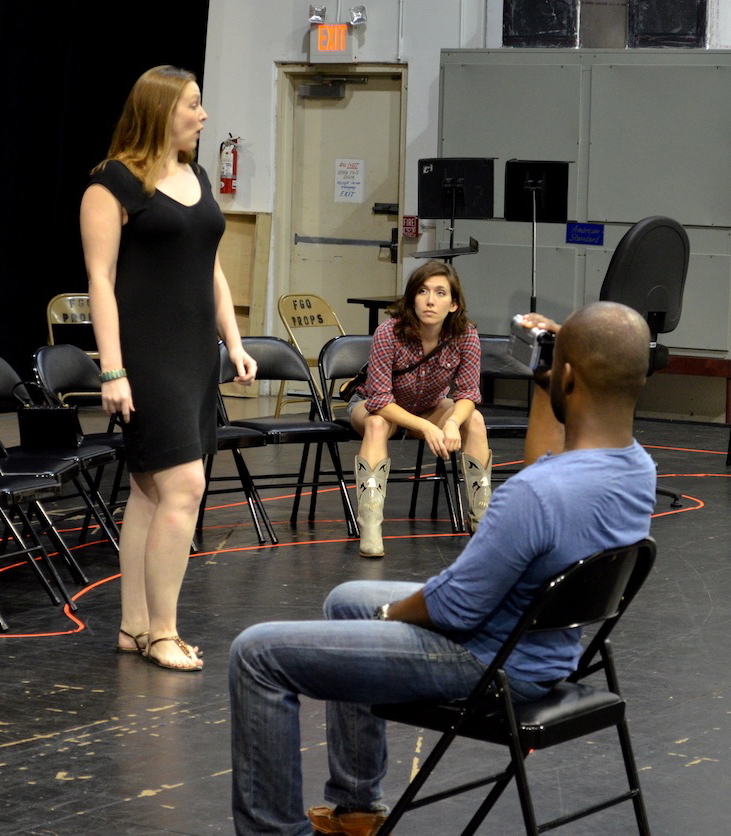FGO to take a trip to the dark side with Vores’ “No Exit”
A valet shows a man into an ordinary living room. Two women soon join him. From the beginning of the opera No Exit, they know they’re in hell. Horror arises as they realize the form their punishment will take.
Composer Andy Vores’ opera, based on the play by the French existentialist philosopher Jean-Paul Sartre, opens Feb. 27 in performances by Florida Grand Opera. The work is an unconventional choice for an opera company that specializes in the classics of Verdi, Mozart and Puccini, and so is the location and the time. Rather than performing in the fancy surroundings of the Arsht Center for the Performing Arts, the company will present No Exit at Arena Lounge (formerly NoWhere Lounge), an event space on Washington Avenue in South Beach. Each performance begins at 10 p.m.
Vores, a native of Wales who lives in Boston where he chairs the composition department of the Boston Conservatory, said he chose the play because he was fascinated by the characters, their deeds, their lies and their predicament.
“They all go through the same pattern of self-deception, trying to deceive each other, owning up and then being parted from the earth,” he said. “The other thing that fascinates me is this is ninety minutes of eternity, and so just the idea of what’s going to be going on in a million years’ time is just so enticing. It’s so rich, it has so many possibilities, it’s really what I responded to.”
For those who hate opera there may be an element of redundancy to the idea of an opera set in hell. Yet it’s precisely to those people to whom this opera could appeal. There will be no one bellowing in Italian or French. The opera will be sung in English. The play is a tense, taut drama, and Vores has set the text in a manner that allows the words to be understood.
“The beauty about the piece is, unlike the standard opera repertoire, this was based on a piece of real theater,” said the mezzo-soprano Caitlin McKechney, who will reprise the role of Inez, for which she previously received acclaim in a 2009 production by Chicago Opera Vanguard. Like the other three cast members, she is a member of FGO’s Young Artist program.
“You have characters that are really fleshed out by somebody who really knew how to write drama,” she said. “From my last experience in Chicago, even people who weren’t big opera-goers really found it interesting because even if you don’t leave feeling happy and ‘Oh, that was very pretty.’ You go in and you have an experience. You have an experience you can really talk about afterwards.”
The opera takes place in a single room. The three characters, a radical journalist, a queen of high society and a working-class lesbian, confront the atrocities they committed to land themselves at their current residence. After realizing there will be no flames, no molten lead or other physical tortures, they come to the conclusion they are to be each others’ tormentors, having been selected to spend eternity together precisely they are the people most prone to irritate, anger and get under each others’ skin.
There is Garcin, the pacifist whose actions undermine all his high-minded writing. He is a coward who ran away from military service, tormented his wife—actually having her serve coffee to himself and the lover he brought home —and now desperately seeks confirmation that he was actually a hero. For the young tenor Casey Finnigan, the role offers the rare chance to play a villain.
“Garcin is the most despicable of all of them because he tries to hide his horrible nature under the guise of self-deluded heroism and even pacifism,” Finnigan said. “He’s the kind of man who takes up a cause in order to hide the fact that he’s got these horrible skeletons in his closet.
“This is a very emotionally raw, visceral, animal kind of show. When you’re setting an opera in hell, I think there are certain expectations. But take it to another level because it’s going to be very rough emotionally.”
Inez, the lesbian who desperately desires the high-society woman Estelle, is the most honest character, facing her own crimes, looking unflinchingly at her fate and refusing to allow Garcin to take refuge in his own self-protective lies.
“Inez is, I think, the smartest of the group, the most self-aware,” said McKechney. “She’s the only person who, when they are getting acquainted with each other in this room, has already come to terms with the fact that she led a terrible life and is an evil person. And in that way, she is really the one the audience can connect to the most because she’s honest.”
The music Vores composed for her character involves wide leaps in range that McKechney says express the emotionally raw nature of the work. Her favorite line is “I know what’s coming. I’m going to burn, and it’s to last forever,” which she says Vores sets particularly effectively. “These giant leaps that are really conducive to screaming out the emotional drama that is in the Sartre already.”
The instrumentation for the opera is as simple as it is weird: a viola, cello, soprano saxophone and percussion. The music—eerie, nagging, unrelenting—allows the words to come through clearly, while expressing the metaphysical horror of the situation.
“The piece is written to be claustrophobic,” Vores said. “The opening material is these procession of six pitches, and that just cycles down slowly, getting slower and slower and lower and lower throughout the entire work. Once you start that pattern, it just keeps repeating and you can’t get out of it.”
Like many contemporary operas, the work reverses the old 19th-century practice of giving pride of place to the music. Here the drama plays an equal role
“Although the musical language of the opera may be tough for people who don’t go to a lot of contemporary music,” Vores said, “the drama of it is so clear, so universal that I’ve found people who don’t normally listen to contemporary music really have gotten a lot from it.”
Since its 2008 premiere by Guerilla Opera in Boston, the opera has received consistently excellent reviews. “Vores created a mesmerizing series of musical extremes (some of the scariest moments involved long-held notes on single instruments),” wrote Lloyd Schwartz, of the Boston Phoenix, on its premiere. “I can’t imagine anyone left the theater unshaken.”
Florida Grand Opera’s production of No Exit runs Feb. 27 to March 1 at Arena Lounge (formerly NoWhere Lounge), 653 Washington Avenue, Miami Beach. fgo.org; 800-741-1010
Posted in Articles
Leave a Comment
Wed Feb 19, 2014
at 4:05 pm
No Comments








